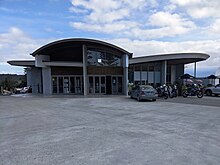Mangawhai Heads
Mangawhai Heads | |
|---|---|
 Mangawhai Heads | |
 | |
| Coordinates: 36°05′42″S 174°35′10″E / 36.095°S 174.586°E | |
| Country | New Zealand |
| Region | Northland Region |
| District | Kaipara District |
| Ward | Kaiwaka-Mangawhai Ward |
| Electorates | |
| Government | |
| • Territorial Authority | Kaipara District Council |
| • Regional council | Northland Regional Council |
| • Mayor of Kaipara | Craig Jepson |
| • Northland MP | Grant McCallum |
| • Te Tai Tokerau MP | Mariameno Kapa-Kingi |
| Area | |
• Total | 6.99 km2 (2.70 sq mi) |
| Population (June 2024)[2] | |
• Total | 2,850 |
| • Density | 410/km2 (1,100/sq mi) |
Mangawhai Heads is a township in Northland, New Zealand. Waipu is 21 kilometres northwest, and Mangawhai is 5 kilometres southwest. Mangawhai Heads is on the north shore of the Mangawhai Harbour.
Geography
[edit]The Mangawhai Cliffs Walkway, north of the township, is 4.5 kilometres long walk to Paepae-o-Tū / Bream Tail, and has a lookout point.[3][4][5]
Mangawhai Heads Beach is an intermediate-level surf beach.[6]
History
[edit]The Mangawhai Harbour is a part of the rohe of Te Uri-o-Hau, a tribal group either seen as an independent iwi, or as a hapū of Ngāti Whātua.[7] The name refers to Te Whai, a historic rangatira of Ngāti Whātua, who shares his name with the short-tail stingray, whai, found in the harbour.[7] Te Whai had a fortified pā at Mangawhai Point, a central headland in the harbour.[7]
Mangawhai Museum, opened in 2014,[8] features displays on the area's local history.[9][10]
A new subdivision called The Rise or Mangawhai North is planned northwest of the existing settlement.[11]
Demographics
[edit]Mangawhai Heads covers 6.99 km2 (2.70 sq mi)[1] and had an estimated population of 2,850 as of June 2024,[12] with a population density of 408 people per km2.
| Year | Pop. | ±% p.a. |
|---|---|---|
| 2006 | 927 | — |
| 2013 | 1,239 | +4.23% |
| 2018 | 1,995 | +10.00% |
| 2023 | 2,685 | +6.12% |
| Source: [13][14] | ||


Mangawhai Heads had a population of 2,685 in the 2023 New Zealand census, an increase of 690 people (34.6%) since the 2018 census, and an increase of 1,446 people (116.7%) since the 2013 census. There were 1,314 males, 1,359 females and 12 people of other genders in 1,101 dwellings.[15] 2.1% of people identified as LGBTIQ+. The median age was 51.0 years (compared with 38.1 years nationally). There were 429 people (16.0%) aged under 15 years, 303 (11.3%) aged 15 to 29, 1,077 (40.1%) aged 30 to 64, and 876 (32.6%) aged 65 or older.[14]
People could identify as more than one ethnicity. The results were 92.1% European (Pākehā); 13.1% Māori; 2.8% Pasifika; 3.8% Asian; 0.9% Middle Eastern, Latin American and African New Zealanders (MELAA); and 2.5% other, which includes people giving their ethnicity as "New Zealander". English was spoken by 98.3%, Māori language by 2.0%, Samoan by 0.2%, and other languages by 7.8%. No language could be spoken by 1.3% (e.g. too young to talk). New Zealand Sign Language was known by 0.3%. The percentage of people born overseas was 21.9, compared with 28.8% nationally.
Religious affiliations were 28.6% Christian, 0.7% Hindu, 0.2% Islam, 0.1% Māori religious beliefs, 0.6% Buddhist, 0.4% New Age, 0.2% Jewish, and 0.7% other religions. People who answered that they had no religion were 62.3%, and 6.3% of people did not answer the census question.
Of those at least 15 years old, 402 (17.8%) people had a bachelor's or higher degree, 1,263 (56.0%) had a post-high school certificate or diploma, and 489 (21.7%) people exclusively held high school qualifications. The median income was $34,400, compared with $41,500 nationally. 261 people (11.6%) earned over $100,000 compared to 12.1% nationally. The employment status of those at least 15 was that 855 (37.9%) people were employed full-time, 351 (15.6%) were part-time, and 51 (2.3%) were unemployed.[14]
Notes
[edit]- ^ a b "ArcGIS Web Application". statsnz.maps.arcgis.com. Retrieved 9 May 2022.
- ^ "Aotearoa Data Explorer". Statistics New Zealand. Retrieved 26 October 2024.
- ^ "Mangawhai Cliffs Walkway". Department of Conservation. Retrieved 18 May 2020.
- ^ Carlson, Liz (7 April 2018). "Mangawhai Heads offers peace, quiet and rugged scenery". Stuff.
- ^ Janssen, Peter (January 2021). Greater Auckland Walks. New Holland Publishers. p. 18-19. ISBN 978-1-86966-516-6. OL 34023249W. Wikidata Q118136068.
- ^ "Mangawhai Heads". Surf Seeker NZ. Retrieved 18 May 2020.
- ^ a b c Kaipara District Council (May 2020). Mangawhai Coastal Walkway (PDF) (Report). Retrieved 3 May 2023.
- ^ "Mangawhai roll of honour board". nzhistory.govt.nz. Ministry for Culture and Heritage.
- ^ "Mangawhai Museum". Mangawhai Museum.
- ^ "Mangawhai Museum on NZ Museums". nzmuseums.co.nz. Te Papa.
- ^ Piper, Denise (6 November 2024). "Beach town Mangawhai to get another 380 houses with The Rise development". Northern Advocate.
- ^ "Aotearoa Data Explorer". Statistics New Zealand. Retrieved 26 October 2024.
- ^ "Statistical area 1 dataset for 2018 Census". Statistics New Zealand. March 2020. Mangawhai Heads (109900). 2018 Census place summary: Mangawhai Heads
- ^ a b c "Totals by topic for individuals, (RC, TALB, UR, SA3, SA2, Ward, Health), 2013, 2018, and 2023 Censuses". Stats NZ – Tatauranga Aotearoa – Aotearoa Data Explorer. Mangawhai Heads (1063). Retrieved 3 October 2024.
- ^ "Totals by topic for dwellings, (RC, TALB, UR, SA3, SA2, Ward, Health), 2013, 2018, and 2023 Censuses". Stats NZ – Tatauranga Aotearoa – Aotearoa Data Explorer. Retrieved 3 October 2024.
